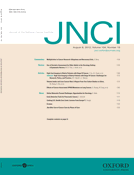Cancer:烟瘾越大,膀胱癌进展越快
2013-01-16 Steven译 好医365
近日发表在美国癌症协会同行评审杂志上的一项新研究发现,吸烟不仅会增加人们患膀胱癌的风险,还会影响肿瘤的发展过程,烟瘾重的人群更容易出现病情恶化。此外,一系列膀胱癌标记可帮助预测高风险病例。 众所周知,吸烟是最常见的膀胱癌致病因素之一,而就吸烟是否会影响肿瘤的恶化过程是研究人员新的关注点。为了对此进行调查研究,来自迈阿密大学米勒医学院的Richard J. Cote博士和来自南加州大学凯克
近日发表在美国癌症协会同行评审杂志上的一项新研究发现,吸烟不仅会增加人们患膀胱癌的风险,还会影响肿瘤的发展过程,烟瘾重的人群更容易出现病情恶化。此外,一系列膀胱癌标记可帮助预测高风险病例。
众所周知,吸烟是最常见的膀胱癌致病因素之一,而就吸烟是否会影响肿瘤的恶化过程是研究人员新的关注点。为了对此进行调查研究,来自迈阿密大学米勒医学院的Richard J. Cote博士和来自南加州大学凯克医学院的Anirban Mitra博士领导的团队对212名不同种族的患者进行了膀胱癌肿瘤和吸烟史方面的调查分析。
研究发现,在膀胱癌患者中,重度吸烟者比不吸烟者或轻度吸烟者更容易死于癌症。此外研究还表明,一些特定的蛋白改变常常出现在严重的膀胱癌中。Mitra博士称:“我们已经识别出9种可准确预测膀胱癌预后的分子标记,这种预后不受常规临床标准和吸烟史的影响。”如果患者的6至9种分子标记出现改变,那么其预后就会很不乐观,这意味着患者只能通过更高强度的治疗来缓解病情。
由于这些蛋白改变的数量与患者的健康结果直接成正比,因此研究确定了一种这样的理论,即在确定某个特定肿瘤的特征上,综合分析各种标记变化比只分析单一变化更重要。吸烟强度与患者预后之间的联系证实,吸烟的危害会逐步积累,不断扩大。
迈阿密大学Cote博士称:“这一研究发现具有非常强的临床相关性,因为膀胱癌治疗的花费往往非常高,而目前的临床分级很难准确判断具体患者的预后,患者急需相关的个性化疾病管理。”

Smoking intensity and cancer markers predict seriousness of bladder cancer
Smoking not only causes bladder cancer—it also affects its course, in that people who smoke more have greater likelihood of developing more aggressive and deadly disease. That is one of the conclusions of a new study published early online in CANCER, a peer-reviewed journal of the American Cancer Society. The study also found that a panel of bladder cancer markers can predict which particular cases are at the highest risk for a fatal outcome.
Researchers have known that smoking is one of the most common causes of bladder cancer, but they’ve wondered whether it also affects how the disease progresses. To investigate, Richard J. Cote, MD, of the University of Miami Miller School of Medicine, and Anirban Mitra, MD, PhD, of the Keck School of Medicine of the University of Southern California, led a team that analyzed bladder tumors and smoking history in 212 multi-ethnic patients recruited through the Los Angeles County Cancer Surveillance Program between 1987 and 1996.
The researchers found that the bladder cancers that developed in individuals who smoked intensely were more likely to be deadly than bladder cancers that developed in those who never smoked, or who smoked less. The study also revealed that changes in particular proteins are often present in bladder cancers that have become deadly. “We have identified a panel of nine molecular markers that can robustly and reproducibly predict bladder cancer prognosis independent of standard clinical criteria and smoking history,” said Dr. Mitra. Patients with alterations in six to nine markers had a very poor outcome, raising the hypothesis that these individuals could have benefited from more aggressive treatments.
Because the number of changes in these proteins was directly proportional to patients’ health outcomes in a progressive fashion, the findings confirm the theory that an accumulation of changes is more important than individual changes in determining the characteristics of a given cancer. The link between smoking intensity and prognosis found in this study points to the incrementally harmful effects of smoking.
“The study’s findings are extremely clinically relevant as bladder cancer is one of the most expensive malignancies to treat,” said Dr. Cote, who is Director of the Genitourinary Malignancies Program at University of Miami’s Sylvester Comprehensive Cancer Center. “Personalized patient management is urgently needed for this disease as current clinical stratification cannot predict outcomes of individual patients.”
本网站所有内容来源注明为“梅斯医学”或“MedSci原创”的文字、图片和音视频资料,版权均属于梅斯医学所有。非经授权,任何媒体、网站或个人不得转载,授权转载时须注明来源为“梅斯医学”。其它来源的文章系转载文章,或“梅斯号”自媒体发布的文章,仅系出于传递更多信息之目的,本站仅负责审核内容合规,其内容不代表本站立场,本站不负责内容的准确性和版权。如果存在侵权、或不希望被转载的媒体或个人可与我们联系,我们将立即进行删除处理。
在此留言










